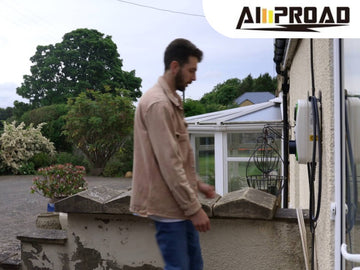
Electric vehicles (EVs) are powered by electricity stored in batteries, requiring charging stations to replenish their range. While public and home charging stations are becoming increasingly available, some EV drivers wonder if portable chargers, which can be plugged into standard outlets, are a must-have for peace of mind. Are these portable chargers a necessary addition to an EV owner's toolkit, or are there alternative solutions to consider?
What Are the Benefits of Portable EV Chargers?
Portable EV chargers offer several advantages for electric vehicle owners, particularly those who frequently encounter situations where access to standard charging stations might be limited. Here's a closer look at two key benefits:
Addressing Range Anxiety:
Range anxiety is a common concern for new EV owners. It refers to the fear of running out of battery power before reaching a charging station. Portable chargers can be a valuable tool in mitigating this anxiety by providing a safety net in unexpected situations.
Imagine you're on a road trip and encounter unexpected detours or delays that drain your battery faster than anticipated. A portable charger allows you to "top up" your battery enough to reach the nearest charging station, eliminating the stress of being stranded with a depleted battery.
Furthermore, portable chargers can be helpful for extending your range for unplanned trips. Perhaps you decide to take a scenic detour on your way home, or you need to make an unexpected stop that pushes the limits of your typical driving range. A portable charger allows you to confidently explore further, knowing you have a backup option for adding some extra miles.
Increased Charging Flexibility:
One of the biggest advantages of portable EV chargers is their ability to provide charging options in locations without designated charging stations. This opens up a world of possibilities for EV owners who enjoy outdoor activities or frequent remote locations.
For example, imagine you're camping in a national park or visiting a friend's cabin in a secluded area. With a portable charger, you can plug into a standard household outlet (with your host's permission, of course) and keep your car charged during your stay. This eliminates the need to meticulously plan your trips around the availability of charging stations, allowing for greater spontaneity and flexibility in your travels.
Portable chargers can also be beneficial for those who live in apartment buildings or areas with limited access to home charging solutions. While a dedicated home charging station remains the most convenient and cost-effective option for regular charging, a portable charger can provide a backup solution for situations where plugging into a standard outlet is the only option.
Are There Any Limitations of Portable EV Chargers?
While portable EV chargers offer undeniable benefits, it's important to be aware of their limitations before investing in one. Here are some key factors to consider:
Limited Range Boost:
It's crucial to understand that portable chargers are not designed to fully recharge an EV battery. They typically offer a limited amount of additional range, usually enough to add a handful of miles or extend your driving radius by a small fraction. This can be incredibly helpful in a pinch, but it's not a substitute for a full charge from a dedicated station.
The exact range boost you'll get from a portable charger depends on several factors, including:
- Charger capacity: Portable chargers come in various wattages, with higher wattages offering a larger range boost. However, higher wattage chargers are also typically bulkier and more expensive.
- Battery size of your EV: Larger battery packs in EVs will take longer to charge, even with a portable charger.
- Depletion level of your battery: If your battery is nearly depleted, a portable charger will take longer to add a meaningful amount of range compared to a scenario where you're topping off a partially charged battery.
Slower Charging Speeds:
Another key limitation of portable chargers is their charging speed. Compared to standard Level 2 charging stations, which can add significant range in a relatively short time, portable chargers offer a much slower rate of charge. This means it can take several hours to add a usable amount of range using a portable charger.
The slower charging speed is primarily due to the limitations of standard household outlets. These outlets are designed for lower power applications, and exceeding their capacity can be dangerous. Portable chargers are designed to operate safely within these limitations, resulting in a slower charging process.
Cost vs. Benefit:
Portable chargers come with an upfront cost, typically ranging from $150 to $400 depending on wattage and features, for example, AMPROAD versatile Max 40A Level 1 and Level 2 EV charger sales at $360 is a wise choice for EV owners. While this might seem like a relatively inexpensive investment compared to the cost of the EV itself, it's important to weigh this cost against the frequency of use.
If you primarily rely on public charging stations or have access to a home charging solution, the need for a portable charger might be minimal. However, for those who frequently encounter situations where access to standard charging is limited, the peace of mind and added flexibility offered by a portable charger can be invaluable.
Are There Alternatives to Portable Chargers?

While portable chargers can be a valuable tool in specific situations, they aren't necessarily a requirement for every EV owner. Here are some alternative solutions to consider:
Utilizing Existing Charging Networks:
The landscape of public charging infrastructure is constantly evolving, with a growing number of charging stations becoming available across the country. This includes networks like Tesla Destination Charger, which offers convenient charging options at hotels, restaurants, and other popular destinations. Additionally, many public charging stations are strategically located along major highways, allowing for easier trip planning and reduced range anxiety.
By utilizing apps and online resources, EV owners can map out charging stops in advance and ensure they have access to charging throughout their journey. This, coupled with the increasing availability of public charging stations, can significantly reduce the reliance on portable chargers for most everyday driving needs.
Focusing on Home Charging:
For the most convenient and cost-effective charging solution, installing a fastest home EV charger remains the ideal choice. These chargers, also known as Level 2 chargers, significantly outperform portable chargers in terms of charging speed. A Level 2 EV charger can typically add a full charge to your EV battery overnight, ensuring you wake up with a fully charged vehicle every morning.
The cost savings associated with home charging are also significant. Electricity rates are typically much lower than the cost of using public charging stations. Additionally, installing a home charger can potentially qualify you for government rebates and incentives, further reducing the upfront cost.
While portable chargers can offer peace of mind in unexpected situations, focusing on building a home charging routine and utilizing the expanding network of public charging stations can often be a more practical and cost-effective approach for most EV owners.
Are Portable Chargers Essential for Every EV Owner?
Portable EV chargers offer a compelling solution for mitigating range anxiety and increasing charging flexibility. They provide a safety net in unexpected situations, allowing you to extend your range or reach a charging station if needed. Additionally, they open up charging possibilities in locations without designated stations, perfect for outdoor enthusiasts or those with limited home charging access.
However, it's important to be realistic about their limitations. Portable chargers offer a limited range boost and significantly slower charging speeds compared to standard charging stations. Their upfront cost also needs to be weighed against the frequency of potential use.
Ultimately, the decision of whether or not a portable charger is right for you depends on your individual driving habits and charging routine. If you primarily rely on public charging stations or have a convenient home charging solution, a portable charger might be a less essential addition. However, for those who frequently encounter situations where standard charging is limited, the peace of mind and added flexibility offered by a portable charger can be a valuable asset.
FAQs / People Also Ask
Do I need a portable EV charger to own an electric vehicle?
Not necessarily. Portable chargers can be helpful in certain situations, but they aren't essential for everyone. If you primarily rely on public charging stations or have a convenient home charging solution (fastest home EV charger), a portable charger might be a less critical investment.
What are the benefits of portable EV chargers?
Reduce range anxiety: They provide a safety net by allowing you to extend your range or reach a charging station if your battery is running low.
Increased charging flexibility: They enable charging in locations without designated stations, perfect for camping trips or remote areas.
What are the limitations of portable EV chargers?
- Limited range boost: They don't offer a full charge, typically adding only a handful of extra miles.
- Slower charging: They charge much slower than standard charging stations.
- Cost vs. benefit: The upfront cost might outweigh the frequency of use for some drivers.
What are some alternatives to portable chargers?
- Utilizing existing charging networks: Public charging stations are becoming increasingly available, and trip planning strategies can minimize range anxiety.
- Focusing on home charging: Installing a fastest home EV charger is the most convenient and cost-effective solution for regular charging.
When might a portable EV charger be valuable?
For frequent road trippers who might encounter unexpected detours or delays.
For those who enjoy outdoor activities or visit remote locations with limited charging options.
As a backup for situations where access to standard charging is limited, like apartment living or unreliable home charging.



